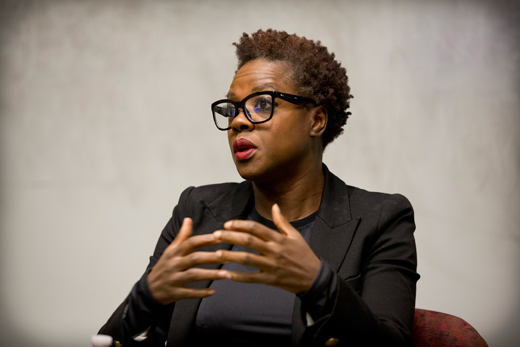Viola Davis, the award-winning actor whose notable appearances in "Doubt" and "The Help" made her name widely known, came to campus Feb. 17.
Davis has been filming in Atlanta the last few weeks, including a scene on Emory's Briarcliff Property. She is producing and starring with Jennifer Lopez in "Lila and Eve," a film about a mother who loses a child to murder.
Davis answered questions from theater and film studies students who gathered in White Hall, giving perspective on acting, Hollywood, balancing art and money and more.
What is the reality of working as an actor?
It is hard out there. You can have all the ideals of the kind of roles that you want but in reality, the materials that are going to be available to you are extraordinarily limited. The lack of aesthetic out there to what is good is just shocking at times.
As an actor, you have very little to no power in controlling what you do.
For actresses of color, you are probably at the greatest deficit.
So you could get a very stereotypical role — listen, I probably had more to do in "The Help" playing Aibilene the maid than I did in "Law & Order" but people had less of a problem with me in "Law & Order" because I played a lawyer.
What are the pressures on actors of color?
The pressure that's put on me is not put on a Jodie Foster or a Meryl Streep. I can't appease something that you need to be appeased in order to feel like you're powerful and significant in the world. The only thing I can do is create a character that is very honest, not even necessarily politically correct.
I know as an actor, every choice I make I know I'm going to feel like I made the biggest mistake in my life and I know that Anthony Hopkins is not feeling that way after playing Hannibal Lecter.
How do you choose your roles?
I always mix it up for exposure because if you don't have a name, you don't have choices. So you've got to do the moneymaking. For example, I did a [director] Michael Mann film because it's going to introduce me to the international audience.
When you're broke, you don't have choices. I don't love money. But I was a person who came from abject poverty. I had $56,000 in student loans. I had bad credit. I have to balance having money and being artistic. So I make choices all the time that fill those two needs.
How do you prepare for your roles?
I use everything — especially my training from Julliard. [Davis trained in the drama program at The Juilliard School.] I always want to connect the role to someone real because that's the element of surprise with people; they never expect anything to be that real and honest. For "Lila and Eve," I interviewed a friend who had a child who was murdered. I read the script and take out all the things you can't change about the character, all the facts. Then, if I don't think the scene is answering my questions, I'll bother the hell out of the director. I allow myself to be in the moment, memorizing the context of the scene instead of the lines.
How does an actor get power?
You always have to climb a ladder. I started working in regional theaters. Then I started auditioning. I got the nurse's role in "The Substance of Fire". That was my name: "Nurse". Then I got other roles, guest star roles. Then I started getting series regular roles in pilots. Then I got a couple of good decent roles in film and then it escalates from there. Embrace your craft. Embrace a level of excellence. So then, when God blesses you and you're in a position of power, you're ready.
What do you think oftelevision as a medium for actors?
I think TV is where it's at. I think there are great opportunities for actors on TV — just the sheer number of stations and outlets like Netflix, Amazon. Especially for actresses of color, the writers are taking risks, more so than even in film in terms of the enormity of the story lines. I don't see it as just a blip.
Do you think there is a black cinema renaissance?
I share Spike Lee's sentiment — "What black cinema renaissance?" It was just five- six films that did really, really well and woke up the studio executives. The studio executives are not necessarily racist; they just don't think of us. But now it's like 'oh "12 Years a Slave" did well and "The Butler" did well. So now we need more slave-butler movies.'
Until we have someone in that top power, at the helm of the ship, that can say yay or nay to material, there is no black cinema renaissance.
What does it mean to be an actor?
It's a privilege to be an actor because we celebrate what it ultimately means to be human. And what it means to be human is just as putrid and sick and beautiful and all of that as anything. And that's our job. And if you filter it, if you're not telling the truth, it's bad acting.

